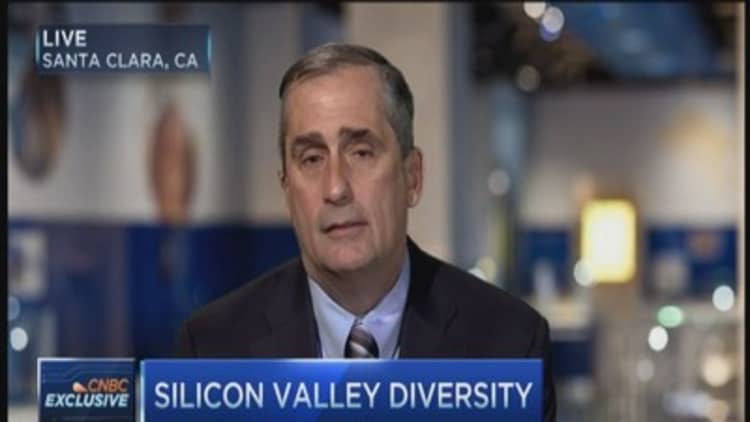Immigrants from around the world are increasingly coming to America. Those patterns have made that perennially unpopular topic — diversity initiatives in higher education— harder to promote at a time when support is flagging.
The education gap between blacks and the broader society has narrowed appreciably, yet still lags at a time when data suggest overall U.S. middle class advancement —and the black middle class in particular—has been stymied by the great recession. In the face of those statistics—and long-held arguments that affirmative action mainly boosts upper middle class blacks—public opinion polls show fairly solid opposition to using race as a university admissions tool.
However, at least one academic argues that changing demographics make the case for more affirmative action.
"When affirmative action started, 99 percent of the blacks in the country were native-born. The assumption was that you'd be helping blacks descendants of slavery and segregation," said Kevin Brown, a law professor at Indiana University's Maurer School of Law and an author of a book that examines the impact of diversity policies on the black community.
Read MoreUPenn leader backs call for affordable college ahead of Obama plan
Brown says the influx of non-whites from places such as the Caribbean, Africa and Latin America has complicated the use of preferences in higher education. According to Center for Immigration Studies data, more than 5 million Caribbean and African citizens immigrated to America in 2013.
Brown argues those migration patterns, along with interracial marriages, are distorting the effects of affirmative action. In fact, he says, it's resulting in a crowding-out effect for blacks born domestically, "jumbling up" results on diversity policies, making it difficult to identify who exactly benefits.
"We never really had a conversation about whether blacks [that were not native born] should benefit, or whether multi-racials should be considered black," Brown said. These groups, he claims, "don't have the same connection to history of oppression and racism in the U.S."
Brown stopped short of completely excluding non-American blacks from preferential admissions, adding that potential candidates who are not African-American can explain their connection to historical oppression, or at least state how they'd fight discrimination.
However, Brown says at the current rate, "native blacks will be almost completely cut out."
'40 years is enough'

Brown, however, may be an increasingly lone crusader in the fight to maintain diversity preferences, with support for affirmative action at or near historic lows. The argument, which atomizes certain demographics and is essentially encapsulated by the idea that being black simply isn't enough to benefit from anti-discrimination protocols, is a deeply polarizing idea in policy circles.
Critics argue that putting a figurative thumb on the admissions scale for diversity purposes are divisive and unnecessary in an era where minorities are already broadening their representation at the heights of business, politics and academia.
John McWhorter, a scholar at the Manhattan Institute and a fierce opponent of affirmative action, recently wrote that racial preferences could be "as toxic as they can be beneficial," mainly because most beneficiaries invariably have lower grades and test scores than the majority of their peers. With a large black middle class, "40 years [of affirmative action] is enough," McWhorter declared.
Read MoreSilicon Valley 'needs guidance' to boost diversity: Entrepreneur
A 2013 Gallup poll showed a clear plurality—67 percent—believe merit, and not race, should be the sole determinant of college admissions. Even blacks surveyed by Gallup were narrowly divided on the issue: 44 percent said spots in college should be based on qualifications alone, while 48 percent said race should be a factor.
Meanwhile, legal challenges to admissions policies at places like the Universities of Michigan and Texas have made even some erstwhile supporters rethink racial preferences as the desideratum of upward mobility.
In a recent study, Progressive think tank The Century Foundation said that race-based affirmative action "may be on its way out," while embracing race neutral initiatives such as class and income levels. Those criteria, the organization said, have shown greater promise in ensuring both quality and diversity at the university level.
Indiana University's Brown, however, was skeptical that admissions policy based on income would rectify the problem he seeks to address.
"If you completely ignore race and focus simply and purely on socioeconomic status, you can't take into account differences in academic performance based on race," Brown said.
"It's right to say that a poor black person will have a harder time than a middle class black person, but it's also right to say middle class black is going to have a harder time than a middle class white person," he added.
Brown likened diversity hiring to post-apartheid South Africa, where native born blacks were given priority in hiring and schooling. Yet even there, affirmative action policy has become a source of controversy as a method of redressing past inequalities.
"Experiences are different and we never really addressed this question" of whether foreign born or mixed race blacks were subject to the same forms of discrimination as African Americans, Brown said, dismissing the idea that his cause didn't account for existing cultural advances.
"What we're doing to adjusting affirmative action to changes in our society, but stressing the positive changes that have occurred in the society," he said.


